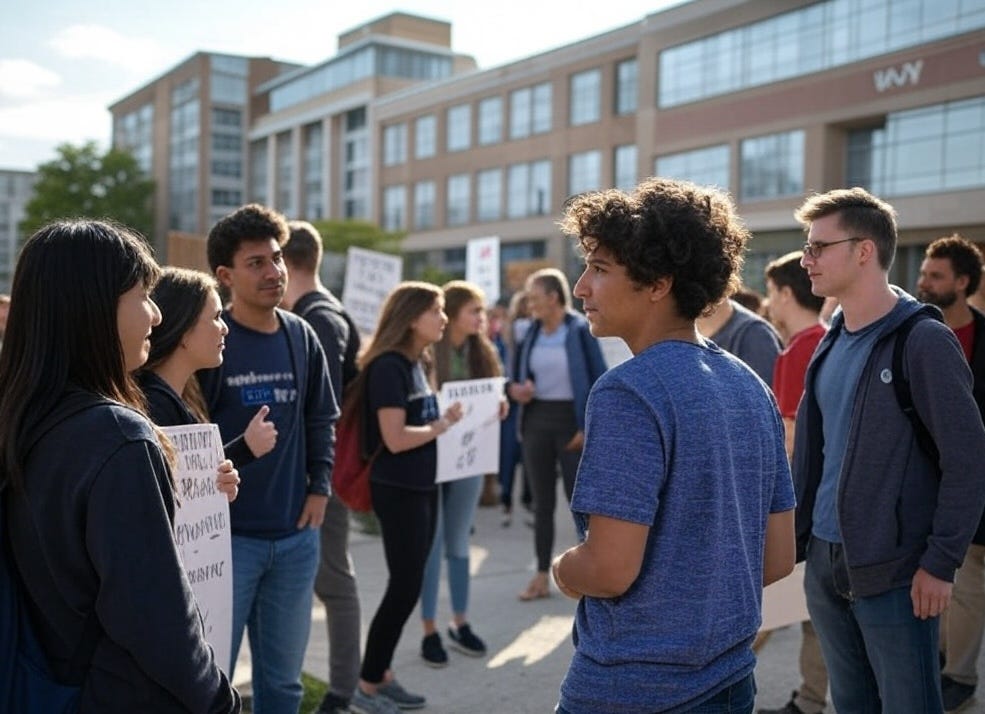Free speech hypocrites

It seems like free speech discourse has finally hit the mainstream media. And this time it isn’t about how racist everyone who is advocating for it is. Now that Trump’s administration is deporting individuals ostensibly for their views, a chorus of voices has risen overnight in defense of speech rights. But forgive me if I don’t quite buy their sudden enlightenment.
You see, my memory might not be so great, but it hasn’t been so long that I’ve forgotten how professors were fired or quietly pushed out for their opinions. How students were hounded and harrassed for theirs. How guest speakers on university campuses were shouted down, or had their events canceled because university administrators preferred appeasement of the mobs over principle. Or how simply defending free speech—once the hallmark of progressive academia—was recast as a right-wing tell, a reason for social exile.
I also recall all the people who had lost their jobs, their businesses, even their lives—not for breaking laws, but for breaking with orthodoxy. I spoke to many of them. Heck, I was one of them. I even wrote a book about it
And you know what? Many of the same voices who’ve now reinvented themselves as proponents of free speech were once more than eager to shut it down for other people. But, now, they’ll have you believe that they embrace it. They don’t. And neither does the media who now has guests on to discuss how terrible this oppression by the Trump administration is.
Their outrage isn’t about principle—it’s about power. They’re not upset that speech is being suppressed; they’re upset that their speech is being suppressed. It’s not the censorship that bothers them, but the fact that it’s no longer under their control in the way it was previously.
If I’m honest—and I try to be—I can’t say that I’m in any rush to proactively defend many of the individuals whose speech appears to be under attack right now. Still, I won’t cheerlead the silencing of anyone, even those who wouldn’t extend the same courtesy to me. Not because I agree with them, but because I believe in the principle of free speech. But I won’t lie: I have limited bandwidth, and it’s hard to rush to the defense of those who once tried to shut down everyone else.
But the principle matters, and that, I will continue to defend.
To that extent, it’s been interesting to watch people who’d previously advocated for free speech twist themselves into a pretzel trying to defend certain actions of the Trump administration. Consider Mahmoud Khalil, a green card holder and activist, who helped organize university protests. Some of these crossed lines—harassment, property damage, worse. There were even whispers of direct ties to designated terror groups. But instead of citing any of that, the administration reached for a vague clause in the Immigration and Nationality Act: his presence and activities in the United States might potentially cause “serious adverse foreign policy consequences.” A broad and discretionary rationale.
Then there’s Rümeysa Öztürk, a student who co-wrote an op-ed expressing solidarity with a group later temporarily banned from campus. For that, according to a Department of State memorandum, her visa was revoked. Was it because of her words? Her affiliations? Again, the government hasn’t made a compelling public case.
Now, I’m no legal expert, so I don’t know if the legal basis will stand. It might. Legally, the administration might be in the clear. And it’s true that non-citizens don’t enjoy the same protections as citizens. But there’s roughly 13 million green card holders living in the U.S., 2-3 million H1B/student/work visa holders, and about 1-2 million refugees. Do they really not get a voice? Where should the line for them be vs for citizens?
If these individuals are deported for illegal actions—violence, trespassing, incitement, material support for terror groups—then so be it (and good riddance!). But that has to be shown. And to my knowledge, so far, it hasn’t been. However, if any individuals were in truly deported for their views, that doesn’t sit right with me—regardless of how I feel about them.
Still, it’s hard to take seriously all the people suddenly demanding that ‘free speech’ is the right of everyone, when the record shows that these same people have tried to shut it down—often viciously. The apparatus they once cheered for is simply being aimed at the wrong direction. I can’t pretend not to notice the irony.
Ultimately, free speech isn’t a partisan weapon. It’s a principle. A fragile one. And it’s revealing, though not surprising, how many people only seem to discover its value when their own words are the ones on the chopping block.
☕️ Consider becoming a paid member today. You can also support my work by making a one-off donation via Buy Me a Coffee.





If I got anything wrong, please do let me know.